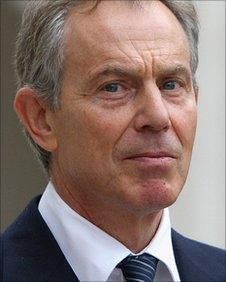Iraq Inquiry: Tony Blair is recalled to give evidence
- Published

Tony Blair appeared before the committee in January
Former Prime Minister Tony Blair is to be recalled to give evidence a second time to the Iraq Inquiry.
He is one of a number of key figures, including former Foreign Secretary Jack Straw, asked to appear before the Chilcot committee again.
In January, Mr Blair defended his decision to take the country to war, saying he had no regrets about it and that Saddam Hussein was a "monster".
The inquiry said it wanted "more detail" in some key areas.
Earlier this year Chairman Sir John Chilcot said there could be more hearings if there were gaps in the evidence or points that needed clarifying.
The committee has now named the individuals who have now been asked to appear again or provide more information as well as a small number of new witnesses.
'Further evidence'
Mr Blair and other witnesses will appear between 18 January 2011 and 4 February.
As for his initial appearance, a public ballot will held to allocate tickets for the central London hearing - with a third of the 60 places set aside for families of those who served or were killed in Iraq.
The BBC's Diplomatic Correspondent Nicholas Witchell said it was not clear why Mr Blair had been asked to appear once more, but there must be significant details that the inquiry wished to clarify following its analysis of documentary evidence and a number of private hearings over the summer.
In seven hours of questioning earlier this year, Mr Blair said the Iraqi regime posed a danger to international security and he would take the same decision again to take part in military action.
In an update on its progress, the inquiry said it would be seeking "further evidence" on certain matters.
"As we draft our report it is clear that there are some areas where we need further detail," Sir John said. "I am committed to taking the majority of this evidence in public."
"In some cases we will be writing to witnesses or government departments asking them to provide a written statement of events, responding to specific questions set out by the Committee. In other cases we will be taking oral evidence."
Other witnesses to be recalled include Mr Straw and former Chief of the Defence Staff Lord Bryce while current Cabinet Secretary Sir Gus O'Donnell and Sir Stephen Wall, once Tony Blair's adviser on European affairs, will appear for the first time.
Legal basis
Former Attorney General Lord Goldsmith, who admitted his view changed about the necessity for a further UN resolution legitimising military action in the run-up to the conflict, has been asked to give further written information.
Among those asked to do the same are John Williams, head of news at the Foreign Office in the run-up to the war, who was involved in early versions of the September 2002 dossier which has since become notorious for its suggestion Iraq could deploy weapons of mass destruction within 45 minutes.
Dr Brian Jones, a senior member of the Defence Intelligence Staff who raised concerns about the 45-minute claim will also provide written evidence.
Neither have, so far, contributed to the inquiry.
The committee has been holding hearings since November, in which it has questioned a host of former Labour Cabinet ministers, senior military commanders, civil servants and diplomats.
A number of former government lawyers have argued that the invasion was unlawful.
From 26 September to 1 October, four of the five-member inquiry panel visited Iraq for private discussions with leading politicians and officials.
Sir John has stressed the final report, not expected to be published before March, will be "full, thorough, evidence-based and frank".
"We are independent of government and will not shy away from criticising if we find fault or if we conclude that errors have been made. We are determined to produce a report that will be useful to future governments," he added.
- Published8 December 2010
- Published30 November 2010
- Published13 October 2010